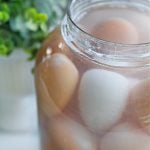How To Waterglass Eggs
Water glassing is a simple and effective method for preserving your surplus eggs, ensuring a steady supply during the winter months. This process helps reduce dependency on weekly shopping trips and allows you to use more of what your homestead provides.
Servings: 1 gallon
Calories: 78kcal
Ingredients
- Fresh unwashed eggs (with the bloom intact)
- Food-grade calcium hydroxide pickling lime
- Water
- Large food-safe container with a tight-fitting lid (e.g., glass jar, food-grade plastic container, crock, or enamelware)
- Measuring utensils
- Food scale
Instructions
- Prepare the Lime Solution:
Dissolve 1 ounce (about 3 tablespoons) of pickling lime in 1 quart of clean, distilled water.
Stir until the lime is completely dissolved.
Prepare the Eggs:
Select fresh, unwashed eggs. Gently wipe off any visible dirt with a dry cloth or paper towel.
Submerge the Eggs:
Place the eggs in a large, food-safe container.
Pour the lime solution over the eggs, ensuring they are completely submerged. (Filling the container with the solution first prevents skin irritation and mess.)
Seal and Store:
Cover the container with a tight-fitting lid.
Store in a cool, dark place like a pantry, cellar, or basement.
Properly stored, the eggs can remain fresh for 12-18 months.
Notes
Freshness of Eggs: For best results, use eggs that are no more than four days old. Fresh eggs have a higher quality and their natural protective coating (bloom) is most effective.
Alternative Eggs: Besides chicken eggs, you can also water glass duck, guinea, goose, and pheasant eggs.
Container Size: Half-gallon or full-gallon jars are ideal. You can also use a five-gallon bucket if you have a large supply of eggs and a big family. Safety Tips: Handling Calcium Hydroxide: Use food-grade calcium hydroxide and handle it carefully, as it can be irritating to the skin and harmful if inhaled.
Storage: Use non-reactive, food-safe containers such as glass jars, crocks, or enamelware.
Monitoring: Periodically check for any signs of spoilage such as off-putting odors or mold growth.
Alternative Eggs: Besides chicken eggs, you can also water glass duck, guinea, goose, and pheasant eggs.
Container Size: Half-gallon or full-gallon jars are ideal. You can also use a five-gallon bucket if you have a large supply of eggs and a big family. Safety Tips: Handling Calcium Hydroxide: Use food-grade calcium hydroxide and handle it carefully, as it can be irritating to the skin and harmful if inhaled.
Storage: Use non-reactive, food-safe containers such as glass jars, crocks, or enamelware.
Monitoring: Periodically check for any signs of spoilage such as off-putting odors or mold growth.
Nutrition
Serving: 1g | Calories: 78kcal | Carbohydrates: 0.6g | Protein: 6g | Fat: 5g | Saturated Fat: 1.6g | Sodium: 62mg | Sugar: 0.6g
